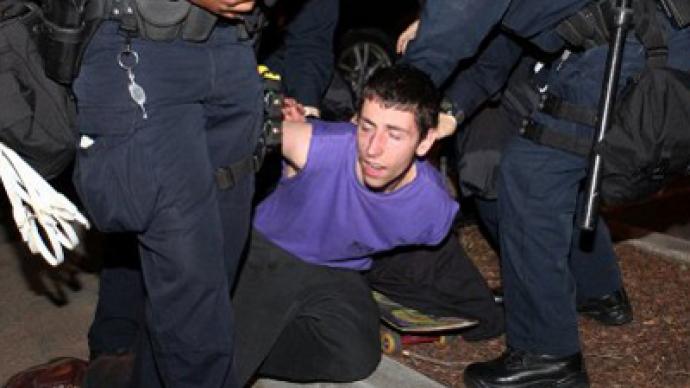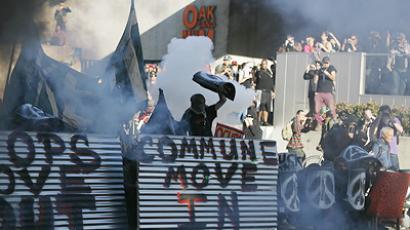"Overwhelming military-type response" - Oakland cops could face sanctions for OWS actions

The city of Oakland, California has been issued an ultimatum by a federal judge: either figure out a way to handle the flood of complaints against the police or start being sanctioned.
District Judge Thelton Henderson has demanded that officials in the Bay Area city start determining this week how to deal with the abundance of accusatory statements filed with Oakland authorities, specifically citing the flood of complaints that have come in over how law enforcement conducted themselves during raids on the city’s Occupy Wall Street protests. In a decision made this week, Judge Henderson says that the Oakland Police Department must submit their proposal on how to handle the grievances within the next week or else be sanctioned by federal authorities. Calling into question the police department’s documented mishandling of protesters demonstrating there under the OWS umbrella, Judge Henderson says that cops have time and time again resorted to "an overwhelming military-type response" when conducting crowd control during a series of events in recent month that have become especially commonplace since the Occupy movement began last fall.In October during the dawn of the Occupy protests, Iraq War veteran Scott Olsen suffered a fractured skull after being hit by a non-lethal projectile fired by Oakland police. The incident caused outrage across America among protesters and non-demonstrators alike, as well as other vets that felt degraded by the same country they took an oath to protect. “I knew that I wasn’t the only person that felt that way,” Marine Jay C. Gentile explained to RT after hearing of Olsen’s injuries. “There are just honestly no words to express the bond that Marines feel for each other. This goes across the service, but it’s very specific for the Marines.”Judge Henderson’s mandate also formally marks for the first time that an official force has deemed Olsen’s injury to stem directly from a law enforcement weapon. Only weeks after that incident, a fellow US vet, 32-year-old Kayvan Sabehgi, was checked into intensive care for a lacerated spleen injury he says he incurred at the hands of the Oakland PD."Then they lined up in front of me. I was talking to one of them, saying 'Why are you doing this?' when one moved forward and hit me in my arm and legs and back with his baton. Then three or four cops tackled me and arrested me,” Sabehgi told the Guardian a day after his arrest.Oakland has been marred by violent encounters involving their police force since before the Occupy movement took hold, as well. The execution of an unarmed subway patron in 2009 spawned massive protests waged at both Oakland elected officials and the police department that deals with issues on the city’s BART — Bay Area Rapid Transit — system. Now three years after Oscar Grant was shot and killed in cold blood on an Oakland train platform, Judge Henderson says that the city needs to take some serious steps to avoid federal intervention."It would be problematic enough if, as seems inevitable, (Oakland police's) compliance levels were to backslide as a result of their failure to address the Occupy Oakland complaints in a timely fashion," explains the judge. "Such failures would be further indication that, despite the changed leadership at the City of Oakland and its police department, (Oakland police) might still lack the will, capacity, or both to complete the reforms to which they so long ago agreed.”














